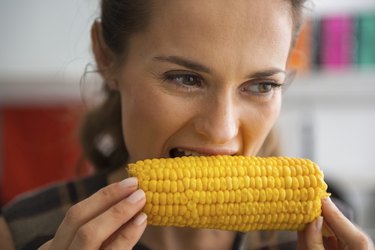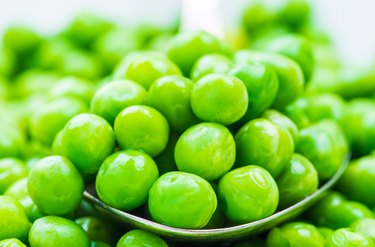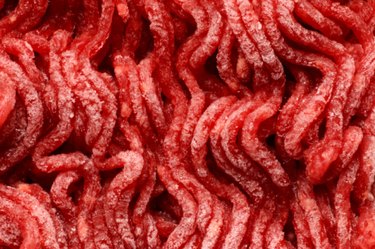
Glucose is the form of sugar that circulates in your blood and provides energy to all the cells of your body. Glucose is the body's preferred energy source, and it is the only one your brain uses. It is easiest for your body to make glucose from carbohydrates like oatmeal, green beans and carrots, but if you provide your body with very few carbs, eventually it will be forced to make glucose from the materials it does have available: protein or fat.
Carbohydrates
Video of the Day

In order to understand how protein and fat metabolism processes are different, let's take a quick look at how you make glucose from carbohydrate. Carbohydrates, whether refined or complex, are just a series of sugars strung together. According to the American Dietetic Association, your body breaks down these sugars into smaller pieces. Once the sugars are reduced to their most basic forms -- lactose, sucrose, fructose or maltose -- then your intestines can absorb them and send them into the bloodstream as glucose, or blood sugar.
Video of the Day
Gluconeogenesis

When your body doesn't have enough carbohydrate on hand, it will turn to protein and fat to make glucose. This reaction happens in the liver instead of the digestive tract. Your body breaks down the proteins, fats and enzymes it has to make glucose in a process called "gluconeogenesis," or the making of new sugar. The down side to gluconeogenesis is that your body will either tear down existing muscles to make what it needs or it will use the proteins in your food, which will prevent those proteins from helping you make new muscles and repair tissue damage.
Fat
Fat provides energy to the liver so it can power the energy-intensive process of making new glucose from protein. When the liver starts using fats, it releases ketones as a byproduct of the chemical reaction. Ketones provide some energy for the body, and they help keep you going until the long process of protein conversion gets into full swing. Ketones are water-soluble fats, and under ordinary circumstances, they leave your body through your breath or in your urine. If you are on a very strict low-carb diet, you might test your urine to check if you are in ketosis.
Protein
Your liver uses pyruvate, lactate, glycerol, and the amino acids alanine and glutamine to make new glucose. The process is time consuming and it uses a lot of energy. It may take a week or two for your body to become efficient at gluconeogenesis. During that time, ketones are keeping your system going. If you are trying to get your body to burn fat and protein for fuel instead of carbs, it is important to eat enough protein sources to avoid having your body scavenge your own muscle tissue.